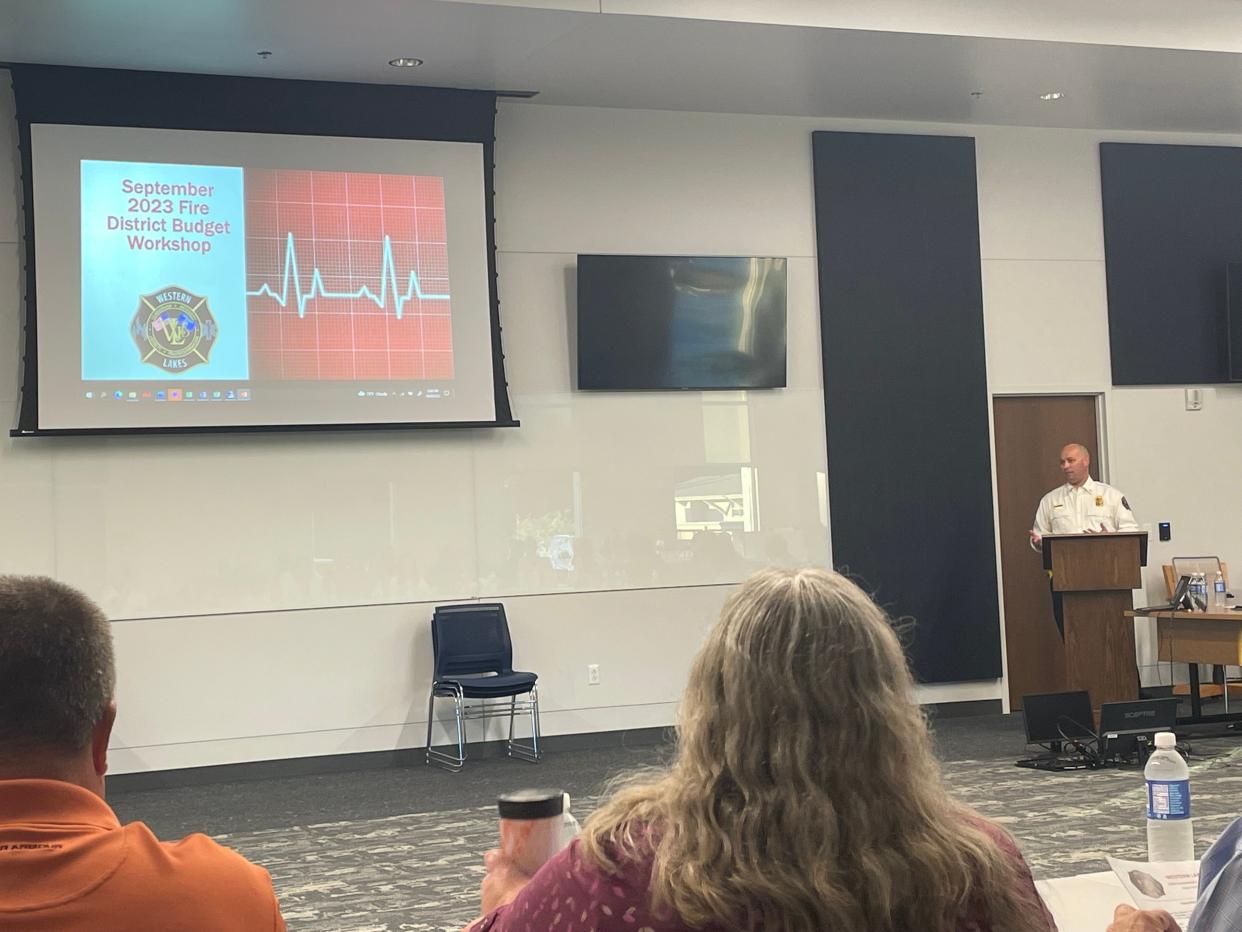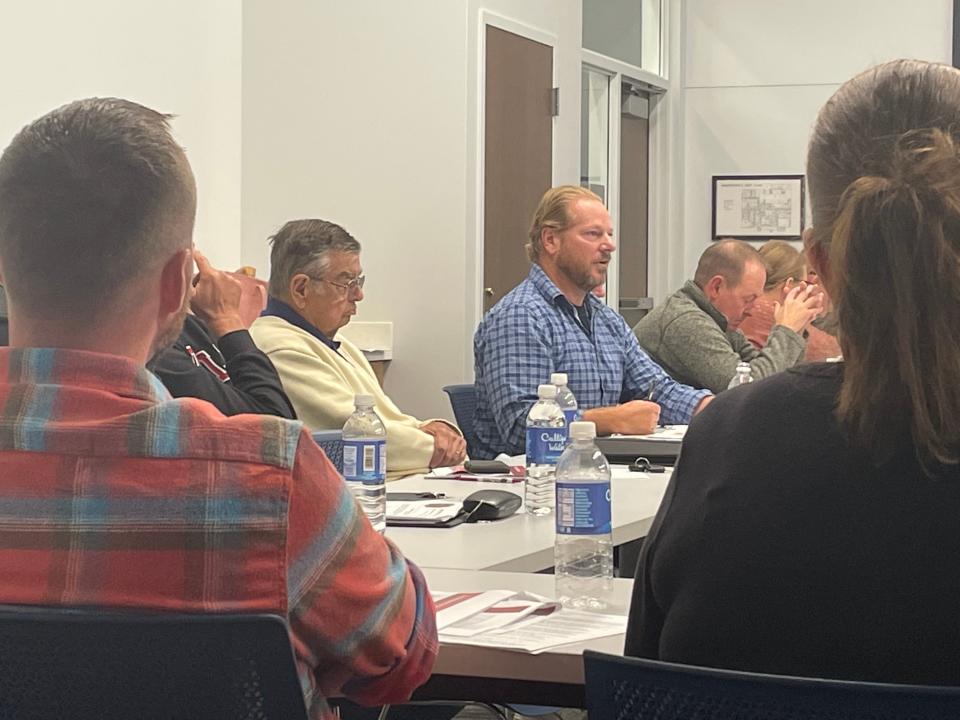Fire Board OKs 60% increase in Western Lakes budget for 2023

The Western Lakes Fire Board has approved a huge increase in its budget for 2023, although only about 60% of what the district had sought in its August referendum.
The fire board and its task force, which was created to look into the staffing crisis facing the district and fire departments all over the state and country, have spent the past month and a half looking at options after a referendum failed in five of seven communities.
Warning that maintaining the status quo would lead to slower response times, increased risk of life and increases in home ownership costs, WLFD Fire Chief Brad Bowen and the board presented a phased-in approach over three years, starting with a $4 million budget increase, bringing its annual budget to about $10.8 million.
This would be followed by two, smaller increases of roughly $1.2 million in 2024 and again in 2025. Only the 2023 increase was decided at the meeting.
The referendum had sought to nearly double its annual budget, adding $6.3 million per year to its annual budget, which currently runs about $6.8 million.
Bowen said adding $4 million to the budget, which the board approved Sept. 28, will help address retention problems by increasing wages to be competitive against neighboring departments that pay more and to address staff burnout by phasing in more full-time positions.
“We have great people here," Bowen said. "The city of Waukesha just hired one of our people last month and are eyeballing (another), and another community is eyeballing another one. We are losing our part-timers, paid-on-calls and our full-timers because we’re not competitive in the market, financially and shift-work wise. The current, in-house personnel are not enough to handle the calls we have.”
In total, Bowen said he planned to hire additional battalion chiefs and 15 new firefighters or paramedics, phased in throughout the year.
"Priority No. 1 is addressing the wage gaps for our comparable to our neighbors and area fire departments," Bowen said. "Right now, our employees could make $4 or $5 more at our neighboring departments or choosing to work in the private sector. That’s adding to our burnout because we can't retain staff who can work for more and with more elsewhere.
"This is a service-based, public-safety-based budget. It’s probably the hardest budget I’ve presented and had to discuss."
A heated debate
WLFD currently provides fire and emergency medical services to the city of Oconomowoc, town of Merton, town of Oconomowoc, town of Ottawa, village of Dousman, village of Lac La Belle and village of Summit.
Officials from each municipality agreed that the proposed budget was steep, and — without all approving the referendum — finding the money would take time that budget season didn't allow for.
Despite that uncertainty, six of the seven communities immediately were in favor of the nearly 60% increase in the budget.
The only holdout was the town of Oconomowoc, where officials were not comfortable paying for a higher level of service because town residents had voted no on the referendum.
“We’ve asked our residents what they want, we presented the best we could and it came back five out of seven said no," said Town Supervisor Eric Mullett. "I think for us now to go and say, ‘You don’t agree with us, we’re going to do what we want to anyways,' we would have our representatives' hides for that. It doesn’t feel right to me.”

Town Chairman Robert Hultquist suggested increasing the budget by 40% or 50% in 2023 or going with 60% in 2023, but then implementing no increases in 2024 or 2025.
A two-hour-long debate followed in which communities attempted to sway the town's stance, including discussion on what a lesser budget would look like and even ramifications if the town of Oconomowoc didn't pay its share.
Despite the town holding firm, the four voting members on the board — the city of Oconomowoc, Dousman, Ottawa and Summit — unanimously approved the budget as proposed. The four communities are owners of the department; the other communities contract for services.
"It’s good to have direction from the municipalities," Bowen told the Journal Sentinel after the meeting. "I’ll continue to work with them to ensure our budget is put together for 2023, that we’ll be able to maintain service for fire and EMS and begin addressing the challenges of our department as well as locally and throughout the state.
"For our people, this is a huge difference. It gets us to the competitive wage market as well as helping them with the bandwidth which leads directly to better response times, their ability to provide services, their mental health, their mental wellbeing."
With the budget in place and municipalities contractually committed to the budget, municipalities must now figure out how to come up with their share to pay for it.
What happens next
Each municipality has a different road ahead and has the ability to choose what is best in its particular case.
The city of Oconomowoc and Lac La Belle, where the referendum passed, stated they plan to raise levy limits up to the amounts approved — to raise $1.3 million and $61,099 increases, respectively.
Ottawa Town Chair Cheryl Rupp said the town plans to enact a fire fee by the end of the year. Ottawa will pay an additional $262,790 toward the increased budget.
Summit President Jake Riley said the village is discussing a fee as well and could also use ARPA funds, stating, "It might be a creative year" to cover the additional $530,062 it is responsible for.
Town of Merton officials said they were looking into a fire fee and possibly a spring referendum with a fee as a backup plan. Its increase for 2023 is $720,583.
Dousman President Jack Nissen said that the village is looking into its options, but is unsure whether it will be able to take any action by the end of the year. He added that officials are considering using a combination of ARPA funds and borrowing to cover the village's $226,693 increase.
The town of Oconomowoc has not yet decided on its plan of action. With the budget passed, officials there will discuss how to cover the town's additional $663,007.
All communities unanimously called on the state Legislature to step in to help.
“I wish our state representatives and our state senators had their butts in those chairs to see how difficult this is, “ said Lac La Belle Village President Tim Clark. “They have no problem sending out fundraising letters instead of doing the hard job for us. They are sitting on a huge surplus that could help every one of us, and what are they doing? It’s just ridiculous. We ought to drag their butts in here and say you’re going to sit down and go through this with us and see the pain. Maybe they’ll start doing their job.”
Drew Dawson can be reached at ddawson@jrn.com or 262-289-1324.
Our subscribers make this reporting possible. Please consider supporting local journalism by subscribing to the Journal Sentinel at jsonline.com/deal.
DOWNLOAD THE APP: Get the latest news, sports and more
This article originally appeared on Milwaukee Journal Sentinel: WLFD budget to increase by nearly 60 percent of Aug. referendum ask

